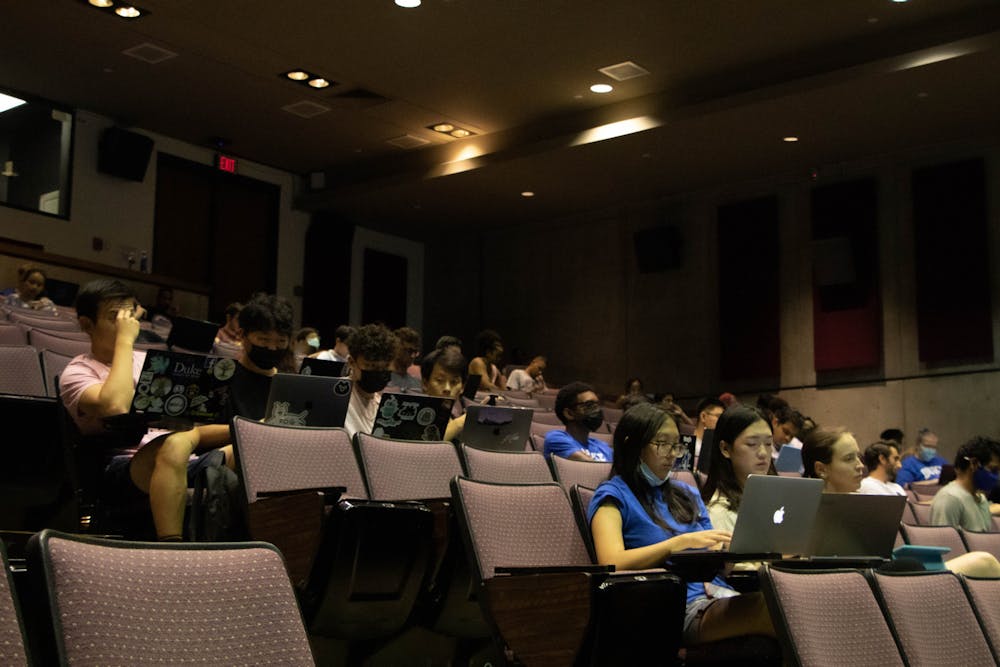Although masks are no longer required in classrooms, some professors are still requiring students to wear them, citing health risks due to their age, while others are taking a middle ground.
Duke lifted its universal classroom mask mandate on Sept. 22 after Durham’s community level for COVID-19 risk classification stayed below the Centers for Disease Control and Prevention’s high-risk category for two consecutive weeks. Durham is currently in the low-risk category.
However, Duke still gave professors the option to request that students continue to wear masks in their individual classrooms and “should clearly communicate those expectations to the class” if they wish to do so.
Berndt Mueller, James B. Duke distinguished professor of physics, is still requiring masks in Physics 142L, General Physics II. A major consideration for him is that he, along with another instructor teaching the class alongside him, are over the age of 65.
“We [are in] the vulnerable age bracket and although we are vaccinated and boosted, we feel it's an unnecessary risk because quite a few students in our class have come down with COVID,” Mueller said. “So the best thing we can do under these circumstances is that everybody wears masks.”
Campbell Harvey, J. Paul Sticht distinguished professor of international business in the Fuqua School of Business, has been outspoken in the past about the University’s policies regarding COVID-19. In September’s Academic Council meeting, Harvey expressed concern about the accuracy of Duke’s COVID-19 testing data. He has previously advocated for the use of higher-quality KN-95 masks in classrooms and long-term solutions like upgrading air filtration systems in classrooms.
But now that Durham is no longer in the high-risk category, Harvey said that he would choose not to mandate masks in class if he were teaching this semester because it makes in-class communication and forming connections with students a lot easier.
Harvey said that he was recently at a conference where a former student approached him. He didn’t recognize who the student was because it was the first time he saw the student without a mask.
“It is very hard to have that kind of personal interaction when you're looking at eyes,” Harvey said. “I much prefer teaching when people can actually see me rather than just my eyes.”
In Computer Science 230, Discrete Math for Computer Science, Bruce Donald, James B. Duke distinguished professor of computer science, is taking a middle ground. His policy balances the in-class experience of students with health and safety concerns.
Although students must still wear a mask in class, they are welcome to remove it when asking a question because it’s easier to see and hear them, according to Donald. He also allows his students to remove their masks to eat or drink in class.
Donald wrote in an email to The Chronicle that he will “generally remove [his] mask to make it easier for [students] to see and understand [him] while lecturing.”
“Personally, this is the first time I have taught without a mask in nearly two years so I do find that invigorating,” he wrote.
Harvey said that he understood that “different faculty [members] are in different positions” with their masking policies, due to their age and risk for COVID-19. If Durham were to return to the high-risk category, he would also require students to wear a high-quality mask in classrooms if the policy doesn’t shift back.
He also added that given the six-week length of courses at the Fuqua School of Business where he teaches, it makes sense that professors want to mitigate their risk of missing class due to isolating from COVID-19.
“At the business school, our courses are six weeks long. So if you're out for a week, or a week and a half, that's a huge chunk of the course gone,” he said.
Mueller felt similarly about his class, which has both a lecture and a discussion component.
“In a physics class of that type, if you miss two lectures, and maybe one discussion session, you are seriously behind,” he said.
Mueller added that while what students do outside of the classroom is outside of his control, his goal is to “deliver the best and safest service to the students.”
Senior Zach Furie took a contrary view and said that he wasn’t sure how effective the classroom mask requirement was in mitigating the spread of COVID-19 among students, but also understood why professors may choose to implement a policy to protect themselves.
Senior Ronan Tegerdine echoed Furie’s sentiments.
“It seems a little silly to force people to wear masks in lectures while everyone knows that people are going to go to different parties later that night, while we're all triply vaccinated,” Tegerdine wrote in a message to The Chronicle.
Get The Chronicle straight to your inbox
Signup for our weekly newsletter. Cancel at any time.

Adway S. Wadekar is a Trinity junior and former news editor of The Chronicle's 119th volume.

